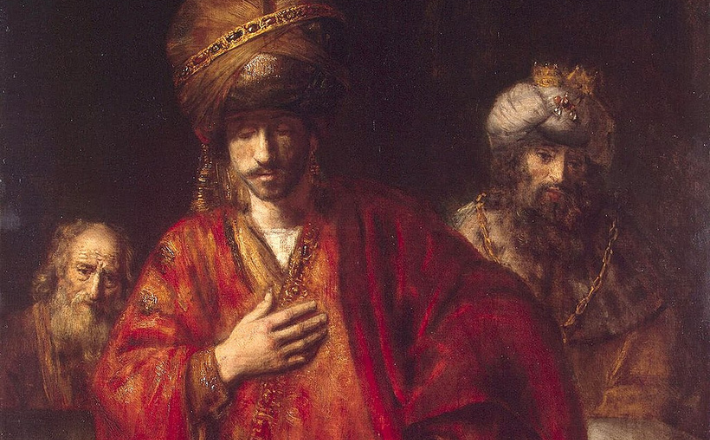Commentary on 2 Samuel 5:1-5; 6:1-5; Psalm 150
Context, context, context! Just as location is all important for home buyers, so is context crucial for understanding every passage of the Bible. Most biblical segments, even law codes, are embedded in a larger narrative that enlightens our understanding. The reading portions for this Sunday highlight David’s rise to power over all the tribes of Israel and his attempts to make Jerusalem the home of the ark of the covenant and thus the religious center of a tenuously united kingdom. Throughout this story, we note the historic division between Judah and the rest of the tribes. After years of conflict with the house of Saul, these pericopes seem to herald good beginnings—even a peaceful commencement—to 33 further years of David’s reign. And yet …
Although 2 Samuel 1-10 seems like a defense of David’s reign, it exposes David’s flaws long before he sinned so disastrously with Bathsheba and Uriah in 2 Samuel 11. Consolidating the tribes and showing respect for the ark and Israel’s religious heritage seem like good moves. However, they are surrounded by incidents of paranoia, duplicity, betrayal, war, and bloodshed. In 2 Samuel 3, Abner, the leader of Israel’s military, who had set up Saul’s son Ishba’al to rule the tribes of Israel, turned those tribes over to David (2 Samuel 2:8-9), who had already ruled Judah at Hebron for seven years (2 Samuel 2:1-4). But the commander of David’s fighting men, Joab, murdered Abner; they had history (2 Samuel 3:26-30).
Another reason for this murder can easily be surmised. Abner was a great military leader and Joab would naturally have been worried that Abner would replace him. Perhaps Abner even hoped for this, although the text only explicitly mentions David’s condition: to re-acquire his wife Michal, Saul’s daughter, who was married to another man, Palti. The text carefully exculpates David from Abner’s murder by insisting he knew nothing about it and demonstrating how he mourned over Abner (2 Samuel 3:28-39). Should the narrator’s strong defense make us wonder if opinions were circulating that suggested he was behind it? However, even on his deathbed, David required Solomon to avenge Abner’s murder by killing Joab (1 Kings 2:5-6). David never punished Joab for this murder during his lifetime; David needed Joab throughout his life to loyally obey and support him.
Another murder that helped consolidate David’s triumph over the house of Saul immediately followed Abner’s, that of Ishba’al, Saul’s son, who had lost Abner’s support. David executed the men who brought him Ishba’al’s head, again showing disdain for those attempting to gain favor by eliminating rivals from Saul’s house. With no king or commander, the tribes of Israel, formerly loyal to the house of Saul, decided to anoint David, uniting with Judah under his rule. They may have been afraid, very afraid of Joab and David, considering the murders of Ishba’al and Abner, which served David politically, even though he had washed his hands of them. A careful reading of the background to our passage, 2 Samuel 5:1-5, stepping back to consider the effect this story would have for the earlier listeners, makes us wonder if the narrator strove to affirm David’s innocence to detractors.
After this transfer of power, David besieged and took Jebus, called Jerusalem, Zion, and the City of David to this day. Alas, this led to a custom of marginalizing the lame and the blind (2 Samuel 5:6-10). Although this is explained, the unfairness remains inexplicable! It is the backdrop for Jesus healing the lame and the blind in the Gospels, which subverts this ancient custom. After inhabiting Jerusalem, David attacked the Philistines, with whom he had been allied when he fled from Saul (1 Samuel 27-29).
Now David was ready to bring “the ark of God, who is enthroned on the cherubim” to Jerusalem, but even this was complicated. It had been housed with Abinadab on a hill in Baale-judah (Kiriath-jearim) ever since it had been retrieved from the Philistines (1 Samuel 6). David rejoiced with “all the house of Israel” while Uzziah and Ahio drove the cart carrying the ark. They danced, made merry, deployed numerous named instruments, thinking all would be well. But it was not. Uzzah was killed for steadying the ark and David became angry and afraid of the LORD. This seems to have been the LORD’s intention. Often, as here, God’s very presence, God’s enthronement is associated with the ark (1 Samuel 4:3). David made a second attempt (2 Samuel 6:12-15), still not employing Levites as Exodus 25:14, 37:5, Numbers 4:5-6, et cetera, required. 1 Chronicles 13-16, written much later than Samuel, says this is the reason for Uzzah’s death, but 1 Samuel 6:7 says only that Uzzah was killed because he reached out his hand to the ark. Both ark incidents in 2 Samuel show David celebrating with sacrifices, music, dancing, and shouting. Psalm 150 is perfectly suited to both settings.
These passages and their contexts demonstrate a new day in Israel and also the complexities of David’s character. David was multifaceted—and multi-flawed, almost from the beginning, but especially as he gained power and prosperity. Many years ago, when asked our favorite biblical character, my mother said David. I was surprised, knowing his grievous failures that included adultery, rape, deception, and murder (1 Samuel 11). However, he was the first to cross my mind too, and he is named by many of my students as well. Consider how many boys are named David! David had a heart for YHWH, as many psalms associated with him illustrate.
Although his great sins had to be brought to his attention by Nathan (1 Samuel 12), so complacent and lost was he at this stage of his life, he repented and was forgiven. Yes, he suffered serious and devastating consequences, for his family and kingdom fell apart afterwards. But he did not lose YHWH. That is of great comfort to us. Whatever our sins have been, David shows even the worst can be forgiven; God will stay with us, though we lose everything else. Many of us identify with Leonard Cohen’s words, “the baffled king composing Hallelujah” and “even though it all went wrong, I’ll stand before the Lord of Song with nothing on my tongue but Hallelujah.”
PRAYER OF THE DAY
Holy One of Israel, King David worked hard to return the Ark of the Covenant to Israel so that the people could honor you in your house of worship. Receive our praise in this house of worship, as we rejoice in your presence. Amen.
HYMNS
Praise to the Lord, the Almighty ELW 858/859, GG 35, UMH 139/826
Praise God, from whom all blessings flow ELW 592/884/885, GG 606, NCH 776-781, UMH 95, TFF 276
Praise Ye the Lord ELW 872, GG 633
I Will Call Upon the Lord GG 621, TFF 277
Here I Am, Lord ELW 574, GG 69, UMH 593, TFF 230
CHORAL
O praise God in his holiness, David Willcocks


October 22, 2023